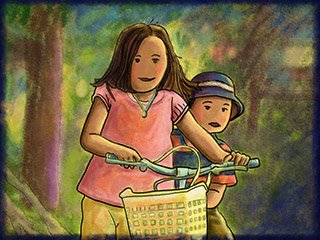Enjoy fun activities in a healthy environment
WHAT YOU CAN DO AND LOOK OUT FOR
- Play make-believe games and let them lead.
Notice how your child enjoys being creative and feels confident in playing roles.
- Support your child when doing something they find unsettling, such as an overnight stay with a relative.
You should react positively and encourage confidence and sense of security in your child.
- Make simple choices available, cloths, food, etc. within limits.
Observe your child’s reactions to choices and how him/her makes own choices.
- Observe them at play with friends and how they solve problems.
Notice your child’s reactions to conflict and even if he/she looks frustrated, allow them to find solutions.
- Emphasise sharing toys, waiting their turn and using words and give them educational toys (i.e. Jigsaw puzzles).
Notice how they stay concentrated for longer time and the effort they put into solving small challenges.
- Use good grammar when talking to your child.
Observe that your child models on parents and adults who care for them and tend to copy the way you talk and use language.
- Explain meaning of words “first”, “second” and “finally” during normal day activities.
Look out for the development of a sense of time and this is a good way to encourage your child.
- Make sure they can follow the story in a book.
Observe how your child is able to follow a story’s plot and how they enjoy reading it over and over again; use the occasion to ask your child to tell you back the story.
- Use books, internet and /or other sources to answer their questions as to “why” something is the way it is.
You should have received many questions from your child and they expect and answer every time, if you run out of answers, check with sources.
- Play counting games in the room, house and in the park.
Observe that you child may not understand the concept of number and it is a good practice to introduce counting when playing hide & seek.
- Teach outdoor games, such as tag or follow the leader.
See how your child begins to follow rules and others and takes turns when required. Games for example ‘Simon Says’, your child can follow instructions and the leader.
- Dance together to their music, imitating each other.
Notice your child has greater control of big muscles (legs and arms) though still requires practice to fine tune coordination, playing music and doing fun games will support physical development.
- Foster habits of good hygiene and support good oral hygiene.
You should encourage your child to keep good hygiene habits including brushing teeth regularly. Even milk teeth should be cared for avoiding tooth decay.
- Keep a clean home environment, free of clutter.
Encourage your child to tidy up and put toys away in a designated place. Your child soon will learn where things are and where she/he should find them.
- Avoid smoking inside the house or in spaces where children gather.
Make your utmost to keep a clean environment free of pollutants.
- Foster the use of seatbelts in the car.
Consider your child’s safety when travelling by car. Buckling up a seat belt greatly increases the chances of survival in the event of an accident.
Average Rating: ☆ ☆ ☆ ☆ ☆ (0 reviews)


